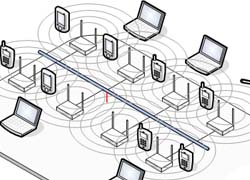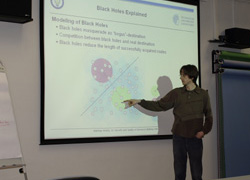IMDEA Networks

Event Category: External Presentation (External Speaker)
Corridor-based routing using opportunistic forwarding in OFDMA multi-hop networks
In multi-hop networks, conventional unipath routing approaches force the data transmission to follow a fixed sequence of nodes. In this talk, we widen this path to create a corridor of forwarding nodes. Within this corridor, data can be split and joined at different nodes as the data travels through the corridor towards the destination node. To split data, decode-and forward OFDMA is used since with OFDMA, one can exploit the benefits of opportunistically allocating different subcarriers to different nodes according to their channel conditions. To avoid interference, each subcarrier is only allocated once per hop. For the presented scheme, the problem of optimizing the network throughput by means of resource and power allocation is formulated and two suboptimal algorithms are proposed to solve this problem with feasible effort. Simulations show that in multi-hop networks corridor-based routing using opportunistic forwarding outperforms conventional unipath routing approaches in terms of achievable throughput.
Read more arrow_right_altThe Next Generation Wireless Sensor Network Challenges for an Emergency Preparedness and Response Class of Applications: A Necessary Public Safety and Security
Wireless sensor network and wireless multimedia network technologies combined with interactive 3D virtual visualization can converge into really interesting and functional applications such as detailed real-time monitoring of environments, emergency response and preparedness, distributed collaborative training, and remote walkthroughs, just to name a few examples. With the recent advances in wireless communication, and the proliferation of portable computer and micro-sensor devices, we are witnessing a growing interest in using wireless multimedia sensor networks and collaborative virtual environment technologies for safety and security class of applications.
Read more arrow_right_altSilver-lining: a firsthand vision of launching a technological start-up
Vishal Misra together with Dan Rubinstein launched at the beginning of 2011 the company Silver Lining. This company is a very ambitious tech start-up arising from two professors of Columbia University, and has already attracted a lot of interest and a substantial amount of funding from investors. Silver Lining is developing a very advanced product in the area of content distribution networks that is expected to have high impact. Vishal Misra, co-founder and its current CEO, will give a first-hand account on the development of this interesting initiative.
Read more arrow_right_altAll-path and Torii-HLMAC: beyond link-state routing protocols in shortest path bridges for campus and data center networks
The dominant paradigm in both IETF and IEEE 802.1 standards for shortest path bridges is based on link-state routing in layer two. This results on hybrid devices of router and switch.
Read more arrow_right_altTechnique for Indoor Position Location of Wireless LAN Clients
If you would like more information about James Aweya, please visit his homepage.
Read more arrow_right_altOn Security and Quality of Service in Multihop Wireless Networks
On Security and Quality of Service in Multihop Wireless Networks Mobile Ad hoc Networks, Wireless Mesh Networks and Wireless Sensor Networks have attracted remarkable attention in the research community in recent years. Fashioned from whatever devices are immediately available, the self-organizing nature of these networks promises spontaneous, untethered communication in absence of infrastructure, or the organic growth of wireless meshed networks. However, the fact that ad hoc and mesh networks are not yetdeployed at large indicates that they are not ready for prime time. This talk discusses selected issues in the area of quality of service and security for multihop wireless networks. We start with an overview on the work carried out at the Mobile Networking & Ubiquitous Communications group at Technische Universität Darmstadt, Germany.
Read more arrow_right_altDelay Tolerant Bulk Data Transfers on the Internet or how to book some terabytes on "red-eye" bandwidth
Many emerging scientific and industrial applications require transferring multiple terabytes of data on a daily basis. Examples include pushing scientific datasets from particle accelerators/colliders to laboratories around the world, synchronizing data centers in different continents, and replicating collections of high definition videos from Olympic Games, taking Location on a different time-zone. A convenient property of all above applications is their ability to tolerate delivery delays from a few hours to a few days. Such Delay-Tolerant Bulk (DTB) transfers are currently being serviced through the postal system using hard drives and DVDs, or through expensive dedicated networks.
Read more arrow_right_altJTP: An Energy-conscious Transport Protocol for Ad Hoc Networks
JTP: An Energy-conscious Transport Protocol for Ad Hoc Networks Energy consciousness is percolating rapidly through all areas of research for technologies that are power driven. In the context of networking, the area of ad hoc networks has been the main driving factor pushing energy-related research, with significant efforts pursued mainly at the physical, data-link and routing layers of the protocol stack.
Read more arrow_right_altInnovating the Multi-Provider Internet
With the Internet offering a single best-effort service, there have been numerous proposals of diversified network services that align better with the divergent needs of different distributed applications. The failure of these innovative architectures to gain wide deployment is primarily due to economic and legacy issues, rather than technical shortcomings. We propose a new paradigm for network service differentiation where design principles account explicitly for the multiplicity of Internet service providers and users as well as their economic interests in environments with partly deployed new services. Our key idea is to base the service differentiation on performance itself, rather than price.
Read more arrow_right_altOptimization, Pricing and Control in Networks
In the last decade, a new theoretical foundation for quantitative network research has emerged. Its key ingredients are the following: economic models to formulate network resource allocation as a convex optimization problem; use of optimization methods to devise decentralized solutions to these problems, in terms of dynamic adaptation of the relevant variables; tools of control theory to understand the dynamic properties of these methods. The resulting body of theory has been highly successful in providing models for TCP congestion control, describing how local protocols should be designed to allow for interesting global properties to emerge. From here, recent research has advanced this methodology to other layers of the protocol stack. In this course we will provide an introduction to this interdisciplinary field of research.
Read more arrow_right_alt











Recent Comments